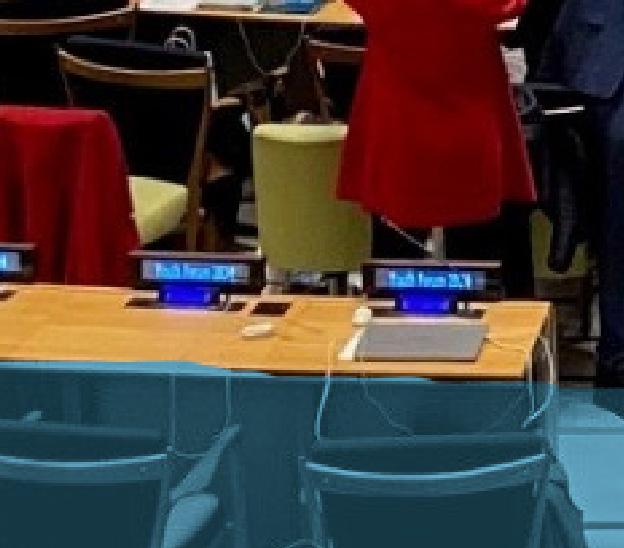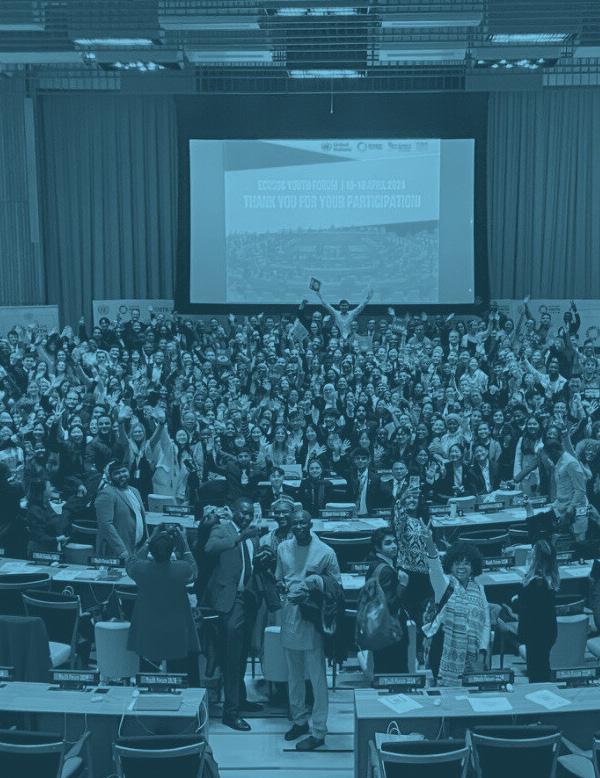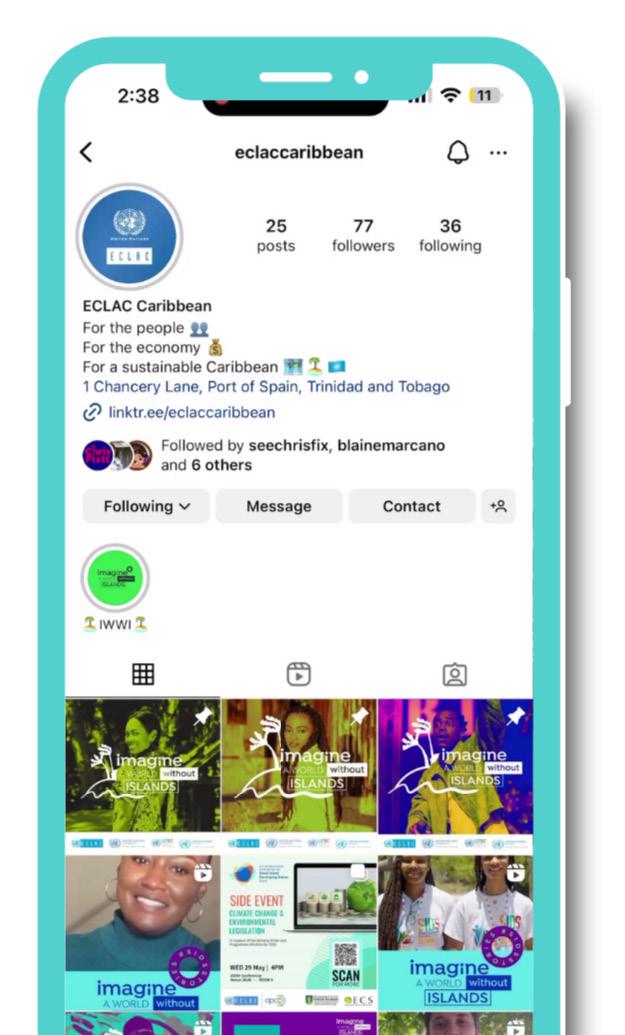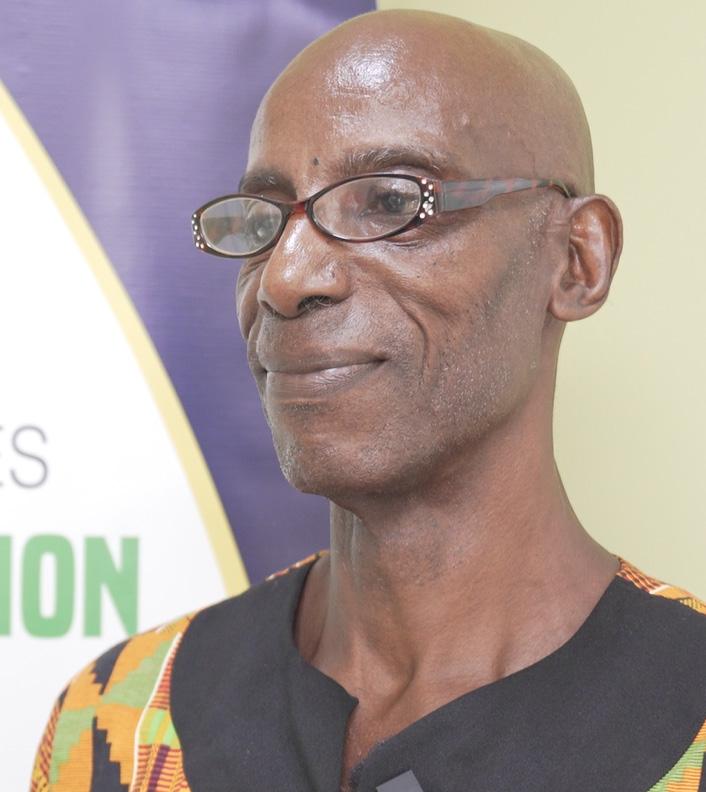SKILLWAVE


SKILLWAVE

ON ERADICATING POVERTY
ROSE BY 55.2% IN 2022, REACHING A HISTORIC HIGH





Issued on a monthly basis, The Hummingbird offers insights into the latest projects, publications, technical assistance missions and research carried out by ECLAC Caribbean. In addition to these, sneak previews are provided of the most salient upcoming events, alongside enriching followups to previously covered issues. With a view to featuring a variety of facets of Caribbean life and lifestyle, The Hummingbird also zooms in on cultural activities and landmark occurrences through an eye-opening regional round-up.
Editor: Jabari Fraser
Writer: Rachael Amanda Espinet Design and Layout: Liseanne Martin-Subero
Please see our contact details on the back cover of this magazine.




Anita Sullivan is allergic to nickel. She used to model. At fashion events, the accessories she wore triggered an allergic reaction. Within ten minutes, her ear would swell and she would have to remove them.
Nickel is commonly found in costume jewellery readily available on the market. Needing to accessorize, Sullivan started making jewellery out of clay and sterling steel, hypoallergenic materials. Soon, her friends asked to buy her earrings. That was the birth of Amaz’s, her business that creates wearable and fashionable statement pieces with non-toxic materials.
Sullivan is one of 21 entrepreneurs and students who took part in ECLAC Caribbean’s Skill Wave: Workshop for Action, Vision and Entrepreneurship, from July 8-12 held at the Ministry of Small Business, Entrepreneurship and Cooperatives in St Kitts and Nevis.
Through her market research, Anita realized by solving her problem she could help other people with sensitive skin. “Now that I’ve pushed it out to the market, I see how I can help women out there,” she said. Facilitator Hayden Blades, a Trinidadian business mentor from



Business Insights, first taught the group to identify their purpose, passion and reason for doing their business.
“We explain to them that this is what you are doing now, and this is why it’s important that they support you in pursuing what has become your passion. Previously you did other things, and now you are doing this jewellery made of non-toxic materials. So now, does the business idea match the passion statement?” Blades guided Anita, as he explained how to write a business plan.
Small and Micro Enterprises (SMEs) are crucial to the region’s economic development. They generate approximately 40 per cent of the Caribbean’s Gross Domestic Product (GDP), yet only 13 per cent of Caribbean SMEs engage in export activities, a major limiting factor to their potential growth. Skill Wave is part of the Building Back Better initiative to help support SMEs become more resilient to economic shocks like the COVID-19 pandemic.
Access to finance is one of the most significant barriers facing Caribbean SMEs, limiting their ability to tap into international markets and export their products. By teaching the SMEs how to write their business plans and assess their financial projections, they can be better equipped to apply for the necessary funding for expansion.
Laughton Pemberton’s business Pembees Naturally in St. Kitts, sells all-natural fruit drinks, made from local ingredients.
Pembees Naturally became so popular that he expanded to make local wine.
Pemberton’s business perspective was magnified so that he could envision “the bigger picture.” He was taught business expansion, cost cutting while remaining operationally efficient and the possibilities of exporting to a large market.
Annetta Tobiene, the owner of Serenity Mobile Spa in St. Kitts, has a mobile spa that brings relaxation directly to clients’ homes, offices, yachts, and hotels. By attending Skill Wave, Tobiene learned how to do analytics and proper business strategy documents. She also networked with entrepreneurs who sell candles and skin care products she can sell alongside her services, giving her clients a variety of options.
“There were so many things I was not clear about on how to operate my business and how to scale my business…There are so many things they touched on, enlightened me and made me feel that I am in a better position to run my business,” Tobiene said.
Skill Wave is part of ECLAC Caribbean’s broader mission to enhance the economic capacity of vulnerable groups such as women, youth, and people in rural areas, helping them identify entrepreneurial opportunities and manage their businesses more effectively. In this cohort, 82 per cent were women and 18 per cent were men. Twenty of the participants were from St Kitts and one from Nevis.


• Difficulty Creating Bankable Business Plans: Many SMEs struggle to present business plans with strong financial projections.
• Knowledge Gap with Lenders: A disconnect often exists between SMEs and lenders regarding the growth potential of small ventures.
• Strict Credit Risk Assessment: Lenders focus on the owner's credit history and assets, overlooking the SMEs' future potential.
With adequate training in record keeping, business plan writing and an understanding of financial presentation, SMEs can better access the funding needed for growth.



ugust 12th is International Youth Day, a time to acknowledge the importance of youth engagement in policy making. To help prepare young people in the Caribbean to engage in policy conversations at the United Nations Economic and Social Council Youth Forum (EYF), ECLAC held the Caribbean Youth Dialogues (CYD) which hosted 100 participants from 16 Caribbean countries in






continued from page 7
Young people from Anguilla, Antigua and Barbuda, Bahamas, Barbados, Belize, Cayman Islands, Dominica, Grenada, Guyana, Haiti, Jamaica, Saint Kitts and Nevis, Saint Lucia, Saint Vincent and the Grenadines, Suriname, and Trinidad and Tobago shared their perspectives on actionable ways to approach eradicating poverty in times of multiple crises. The young people addressed many complex challenges the Caribbean has been grappling with, such as the COVID-19 pandemic, climate change, and social instability. The discussions highlighted the pivotal role youth-led initiatives have in helping to increase collaboration
among young people, governments, and civil society to address regional challenges.
Economic Affairs Assistant at ECLAC Caribbean, and one of the main organizers of CYD Candice Gonzales said the Commission recognizes the crucial role of Caribbean youths as “dynamic agents of change,” and it is important to affirm and hear their views on essential issues affecting them. “ECLAC, along with other UN and development partners in the Caribbean, has facilitated the platform where young people can convene to discuss the issues that affect them, propose…We affirm
their significant contributions in addressing challenges such as climate change, food security, and economic empowerment through their passion, innovation, and determination”.
Gonzales said their active participation in advocacy, community projects, and entrepreneurship not only propels progress toward SDG implementation but also fosters an inclusive and sustainable future for the region. Tehilla Maloney from Caribbean Regional Youth Council (CRYC) in Trinidad and Tobago, said Caribbean youth need more than temporary solutions, but










rather strategic and sustainable long-term change in order to tackle some of the social issues they encounter.
“It is our responsibility to prioritize the well-being and empowerment of our youth, recognizing them as pivotal stakeholders in the region's development trajectory…Let us seize this moment as an opportunity to mobilize collective action, forge meaningful partnerships, and advocate for policies and programs that prioritize the longterm empowerment and long-term wellbeing of Caribbean youth.”
She said together as a region youth can tackle any obstacle put in front of them to realize an inclusive, resilient and prosperous Caribbean.
Haitian civil society leader, Lenz Wendy, founder of HART’s Haiti Inc, a non-profit organization dedicated to using creativity and technology to tackle social issues in education and society, said it would be difficult to achieve the
SDGs if young people are not properly educated. “Education is important not only for social and economic stability, but also to ensure that the future youth generation will also have a seat at the table to have a say in their development”.
Barbadian student Pierre Cooke Jr said climate change threatens the food security of small island developing states (SIDS). “While we continue to have conversations about sustainable agricultural practices and farming practices, we must acknowledge that there is a very real threat that most, if not all of us face, of potentially being impacted by a hurricane or a tropical storm that could threaten our food and nutrition security”. He said making agriculture practices climate resilient by developing production methods and ways of storing foods that can survive natural disasters, can create food security in the region.
Jamaican climate activist, Chevánt Hamilton, the National Coordinator
for the Commonwealth Youth Climate Change Network (CYCN) said the average young person does not know what role they can play in effecting change in climate activism. “The climate change conversation is still at a high technical level. Average young people are not adequately sensitized as to why they should even care about climate change and the role they play. This makes engaging them, or their ability to start projects that are aimed at alleviating the impacts of climate change somewhat difficult.” He said climate change is a challenge that requires engagement from the entire society. The public, private, and civil society actors should play a role in safeguarding from climate change by achieving a low carbon, climate resilient society.
In a new report, ECLAC calls on countries to improve their policy design to take advantage of the contribution that FDI can make to the energy transition and to the region’s sustainable productive development. In 2022, Latin America and the Caribbean received $224.579 billion dollars in Foreign Direct Investment (FDI), a figure that is 55.2% above 2021 levels and marks the highest value on record, the Economic Commission for Latin America and the Caribbean (ECLAC) revealed today.
This result is mainly attributable to the increase in FDI in some countries, particularly in Brazil; to growth in all the components of FDI, especially earnings reinvestment; and to the increase in FDI in the services sector. This dynamic is consistent with the post-pandemic recovery and it is unclear whether it will stay at similar levels in 2023, according to the annual report Foreign Direct Investment in Latin America and the Caribbean 2023.
FDI inflows to Latin American and Caribbean countries had not topped $200 billion dollars since 2013. These flows also increased as a share of regional GDP in 2022, accounting for 4.0%, the document states.


“The challenge of attracting and retaining Foreign Direct Investment that contributes effectively to the region’s sustainable and inclusive productive development is more relevant than ever. There are new opportunities in an era of reconfiguration of global value chains and geographic relocation of production in the face of a changing globalization,” said ECLAC’s Executive Secretary, José Manuel Salazar-Xirinachs, who presented the study’s main conclusions during a press conference in Santiago, Chile.
The senior United Nations official emphasized that “the challenge is not only to attract and retain, but also to maximize FDI’s contribution to development, and to this end countries must focus on post-establishment productive development policies, which include the promotion of productive linkages, policies for adding value and moving up value chains, for human resources development, infrastructure and logistics, and building local capacities.”
The global FDI scenario in 2022 was heterogeneous, ECLAC indicates. While these flows grew in Latin America and the Caribbean and in other regions of the world, they decreased in the United States and in some European Union countries. Overall, global FDI inflows shrank by 12% versus 2021, totalling $1.29 trillion dollars.
The report reveals that nearly all the countries of Latin America and the Caribbean saw an increase in Foreign Direct Investment in 2022. Leading the list were Brazil (which received 41% of the regional total and ranks as the No. 5 destination for global FDI), followed by Mexico (17%), Chile (9%), Colombia (8%), Argentina (7%) and Peru (5%).
Costa Rica was the main Foreign Direct Investment recipient in Central America. In Guatemala, these flows showed a significant decline due to an extraordinary value recorded in 2021, but they returned to their historical average.
There was also a positive change in FDI inflows to the Caribbean, fuelled mainly by greater investment in the Dominican Republic, which was the second-largest recipient country after Guyana.
At a regional level, 54% of Foreign Direct Investment went into the services sector, although both the manufacturing and natural resources sectors also rebounded. Financial services; electricity, natural gas and water; information and communications; and transportation-related services had the largest share of investments in the services sector as a whole.

The United States (38% of the total) and the European Union (17%, excluding the Netherlands and Luxembourg) were the main investors in the region, while FDI coming from countries within the Latin America and Caribbean region experienced a significant increase, rising from 9% to 14% of the total.
In fact, the ECLAC flagship Foreign Direct Investment in Latin America and the Caribbean 2023 points to a more than 80% increase in FDI from Latin America and the Caribbean to destinations both inside and outside the region. In 2022, the amount invested abroad by transnational Latin American companies, known as translatinas, reached a historic high: $74.677 billion dollars, which is the highest figure recorded since this series began to be compiled in the 1990s.
Furthermore, the amount of FDI project announcements in Latin America and the Caribbean grew by 93% in 2022, totalling nearly $100 billion dollars. For the first time since 2010, the hydrocarbons sector (coal, oil and gas) led the announcements, with 24% of the total, followed by the automotive sector (13%) and renewable energies (11%).
The study also includes two chapters that analyze FDI trends in non-renewable and renewable energies in the context of the energy transition and fulfilment of the Sustainable Development Goals (SDGs). In addition, they address the key role of governments in this area, identifying challenges and opportunities and making policy recommendations.
The energy transition is identified by ECLAC as one of the sectors driving economic growth that can become a major engine for the region’s productive transformation, which means that countries and their territories should prioritize it within their productive development policies and agendas.
The percentage of installed capacity of renewable energy in Latin America and the Caribbean is higher than the global average, and the electrical power generation matrix is among the cleanest in the world. Therefore, if the region were to increase its supply of renewable energy, it could become a place of origin for the production of goods that are being produced today in countries with comparatively less clean matrices. FDI
can play a critical role in accelerating the energy transition, facilitating technology transfer and enabling emerging technologies.
Governments must lead the coordination of strategies for the energy transition’s success in the region, the Commission underscores. “They are responsible for making sure that non-renewable energy activities are reduced radically, as required by the climate commitments, while managing to mitigate their negative effects and their economic and social costs, especially in terms of investments, employment and income. One of their central functions is to develop long-term policies that promote investments in renewable energy sources, so that the transition is rapid and secure, and does not leave the region lagging behind in a context in which energy from clean sources is a factor of competition,” the study states.
Nonetheless, ECLAC also warns that in this process, consideration must be given to the importance that the non-renewable energy sector still has for some countries in the region, especially in terms of generating revenue to address social demands, those related to productive development and to energy security.
Beyond the challenges of the energy transition, the report insists that Latin American and Caribbean countries must improve the design of policies to attract investment and strengthen their institutional capacities in this area. It is essential that progress be made on articulating efforts to attract FDI with countries’ and territories’ productive development strategies, and that FDI begin to be used with greater directionality as a strategic tool for furthering sustainable productive development processes

A quick and flavorful dish that brings the Caribbean to your table in just a few easy steps!
What you will need:
(Serves 4)
• 1 can (13.5 oz) coconut milk
• 1 small onion, finely chopped
• 2 garlic cloves, minced
• 1 tomato, chopped
• 1 sprig of thyme
• 1 scotch bonnet pepper (optional, for heat)
• 4 pieces of fresh fish (snapper or your favorite white fish)
• Salt and black pepper to taste

How to Make it:
Step 1: Season the Fish: Season fish with salt and black pepper on both sides.
Step 2: Cook the Coconut Sauce:
In a large skillet, add coconut milk, onion, garlic, tomato, thyme, and the scotch bonnet pepper. Simmer on medium heat for 5-7 minutes, stirring occasionally.
Step 3: Add the Fish: Place the fish directly into the simmering sauce. Spoon the sauce over the fish to coat. Cover and cook for 8-10 minutes, or until the fish is cooked through.
Step 4: Serve: Remove the scotch bonnet pepper before serving (if using). Serve hot with steamed rice or bread.
Optional Sides: Steamed rice or bread for soaking up the sauce.




